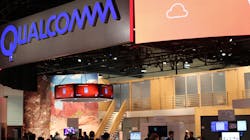Days After Regulators, Apple Sues Qualcomm over Licensing Terms
Qualcomm is coming under fire again for how it sells access to its wireless patents. On Friday, Apple filed a lawsuit against Qualcomm in federal district court, saying that the chipmaker imposed unfair licensing terms and punished the company for its testimony in an antitrust investigation.
The lawsuit comes just three days after the Federal Trade Commission filed a complaint that Qualcomm had violated antitrust laws. The heart of that complaint is that Qualcomm has not licensed its wireless communications patents in a “fair, reasonable, and nondiscriminatory” way.
Apple factored into that complaint. The FTC said that Qualcomm gave the company billions in "incentive payments" to use its modem chips exclusively in iPhones and iPads - an arrangement that lasted from 2011 to 2016, the agency said. Apple faced losing billions in saving if it turned to another supplier.
Qualcomm has earned thousands of patents over the years, but its most important ones contain standardized technology for 3G and 4G communications. Apple and other smartphone makers like Samsung need that technology to help them access wireless networks to stream video or make calls.
Qualcomm has been criticized for charging companies too much to license its entire patent portfolio, parts of which some companies don't even need. It has also been accused of holding its chip supply hostage until manufacturers agree to its licensing terms. Regulators have also said that its refusal to license patents to rivals has limited competition in wireless chip market.
"To protect this business scheme Qualcomm has taken increasingly radical steps," Apple said in a statement provided to Electronic Design, "most recently withholding nearly [$1 billion] in payments from Apple as retaliation for responding truthfully to law enforcement agencies investigating them."
Part of what Apple seeks in the lawsuit is that $1 billion.
Last month, South Korea's top regulator fined Qualcomm $853 million fine, building on its earlier lawsuit that Qualcomm had offered rebates to phone makers who agreed to buy its products exclusively. The Korea Fair Trade Commission disclosed that Apple and other smartphone makers had cooperated with the investigation, which started in 2013.
Qualcomm has vowed to fight both the South Korean ruling and the Apple complaint. "Apple has intentionally mischaracterized our agreements and negotiations, as well as the enormity and value of the technology we have invented," said Don Rosenberg, Qualcomm's general counsel, in a statment.
The chip maker has faced similar complaints in the United States and Europe. An investigation into its licensing business is going on in Taiwan. In 2015, Chinese regulators imposed $975 million in fines on Qualcomm and forced the company to renegotiate deals with Chinese firms that had been paying for its patents.
Apple is casting a smaller net than regulators, focusing on Qualcomm's high royalty rates. "Despite being just one of over a dozen companies who contributed to basic cellular standards, Qualcomm insists on charging Apple at least five times more in payments than all the other cellular patent licensors we have agreements with combined, Apple said in its statement.
"We are extremely disappointed in the way Qualcomm is conducting its business with us and unfortunately after years of disagreement over what constitutes a fair and reasonable royalty we have no choice left but to turn to the courts,” the company added.
About the Author
James Morra
Senior Editor
James Morra is the senior editor for Electronic Design, covering the semiconductor industry and new technology trends, with a focus on power electronics and power management. He also reports on the business behind electrical engineering, including the electronics supply chain. He joined Electronic Design in 2015 and is based in Chicago, Illinois.


